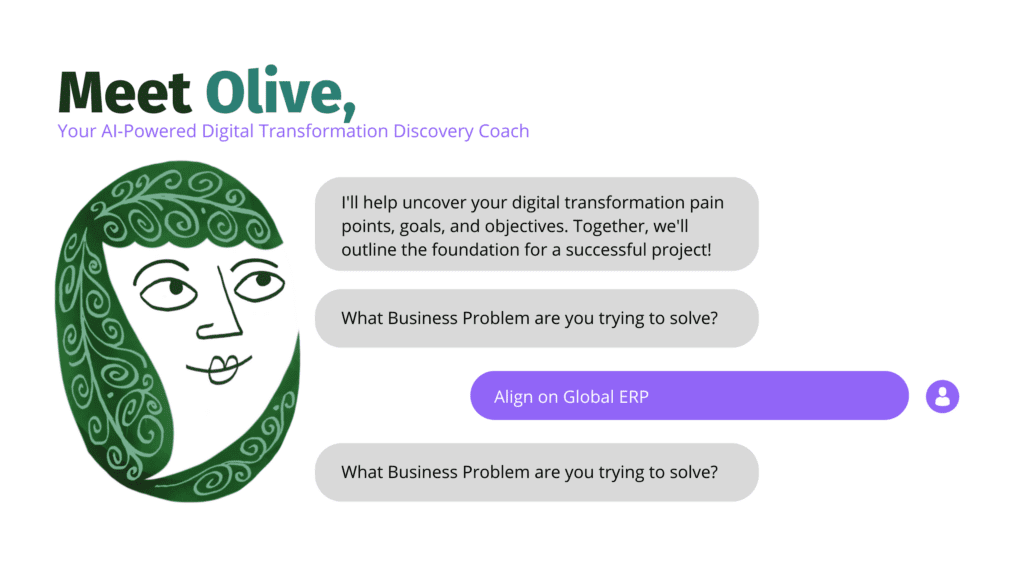The financial, operational, regulatory, and psychological effects of COVID-19 will linger past the social distancing and isolation phases, changing the customer experience forever across various industries. The pandemic has forced many technically laggard sectors to adopt new technology and reinvest capital into digital infrastructure.
At Olive, we aim to streamline decision-making for IT products and services, reducing companies’ costs as well as reliance on outside consultants.
Our approach to selecting software is; lead with your business needs first.
It is now more important than ever to ensure you choose the right CRM platform for this ‘new normal.’
The COVID-19 pandemic is serious, and smart companies are indeed prioritizing taking care of their employees in a meaningful way. However, now more than ever before, organizations must adapt to new customer behaviors. To be successful, they must ensure work gets done, sales are made, and customers have a great experience. Ensuring that you have the right customer relationship management (CRM) platform in place is an essential investment in these times.
A best-fit CRM will ensure the following;
- efficient management of interactions with customers
- management of customer data
- maximize the efficiency of your staff
- automated processes connected with a customer’s journey through the marketing and sales funnels
Maintaining a Great Customer Experience. Why do you need a great CRM now?
The pandemic has revealed a need for businesses to adapt their offerings and services to meet consumers’ changing requirements and expectations. It’s time for you and your company to look forward and anticipate these changing needs, or customers may disregard you as an option.
A CRM can act as the one truth for your customer-facing activities, and there are CRM software platforms available for most businesses, whatever the size, complexity, or industry.
Having the best match CRM to your business needs ensures that your customers are correctly targeted with timely personalized communication.
In this new era, you must ensure the customer experience is as easy and as seamless as possible. CRM platforms are not new. Many successful businesses have been efficiently managing their consumer database with them for years; however, now they realize that they may not have leveraged all the functions of the CRM software they are currently using.
Because of COVID-19, companies are in a rush to use all the useful features their CRM has always provided to ensure they are reaching customers in the best way, generating leads, making sales, managing customer interactions, and keeping remote employees productive as possible. In 2019 CRM usage increased from 56% to 74%. Now, that statistic is only rising.
This ‘new normal’ post-pandemic has forced some businesses to accelerate their digital transformation, explicitly ensuring they have the best CRM system for these evolving needs.
Benefits of having the best CRM for your business in place right now;
- Never miss an opportunity – connect CRM systems to your website to catch leads.
- Collaboration with remote employees – leverage the CRM to create workflows alerts and reminders
- Maintain connection with your employees, customers, and communities – with bulk email campaigns and workflow templates
- Be proactive – maximize downtime to clean up data and contact lists efficiently.
- Increased remote productivity – integrating office systems like calendars, meetings, communications, etc.
- Understand your customers – leverage data to understand your customers changing needs.
Do You Have The Right CRM Solution for your Business Needs?
With so many CRM platforms on the market, picking the right one for your business can be overwhelming. Now, more than ever, leaders must ensure they have a CRM platform that works for their specific requirements. Furthermore, the CRM platform should integrate with the existing technology infrastructure in the company.
You may be losing leads and wasting resources.
Unfortunately, current software procurement practices fail to deliver on their expected returns for CIOs seeking CRM platforms and other technology solutions. The pandemic has undoubtedly increased the urgency to find the right solution. Many are learning that the CRM platform software they have relied on before the pandemic does not meet the business’s current needs, and might be costing sales and creating less than ideal customer experiences.
At Olive, we aim to bridge the gap between buyers and sellers, and it is our mission to help you find the best CRM software solution for your unique and evolving business needs. We believe the secret to finding the best CRM is to lead with these business needs.
Whether you are looking for a different CRM solution that will meet your customers’ current and changing needs and business post-pandemic, or you are dipping your toe into the pond of digital transformation for the first time, following these steps should help you find your best match software solution.
How to Choose the Right Enterprise CRM
1. Identify your needs and goals
Most CRM platforms on the market today are fully customizable, but you need to be fully aware of your business needs and blockers to make the best choice. Googling “Top CRM platforms 2020” will not deliver a specific result based on your needs. What works great as a CRM for bricks and mortar retail brands may not do for a predominantly online B2B organization. With an endless collection of CRM platforms to select from, it’s essential to examine your business goals and objectives, know your customer’s needs and behaviors, and use this information to define what you need from a CRM platform.
2. Map out Processes
To effectively achieve your goals, you must map out your processes. This will help you understand and explore what can be automated by the CRM to increase efficiency.
3. Define and Rank your CRM Requirements
Now that you have identified your needs and goals and mapped out processes, the next step is to define your specific CRM requirements and rank these needs against your business objectives. The more stakeholders engaged at this point, the more complete your list of CRM requirements are, and you will be more precise on what “best-fit” means for your organization.
4. Ensure software integrates with existing infrastructure
It’s essential to identify any existing infrastructure that must integrate with the CRM. Ensuring that your CRM integrates with existing software used in the company will only improve the customer experience by increasing their understanding of your business.
Aggregating data from multiple touchpoints with CRM data will help you understand your customer’s journey.
5. Explore the Available Options
Now that you have clearly defined the CRM needs, features, and integrations you need, with the input of essential collaborators, the next step is to look at that long list of vendors and narrow the choices down to a shortlist of solutions.
Traditionally, this is done by reading and finding testimonials from other organizations, or searching for CRM reviews on Capterra or G2Crowd. Remember that enterprise CRM software comparison sites will deliver results based on all potential customers’ combined average needs rather than your own. Additionally, consider that many of these vendors pay to play in this space, and there may be some bias attached to the options presented. With Olive, we don’t charge vendors, so you can be confident that there is no bias on the shortlist.
6. Evaluate Vendors
Now that you have a shortlist of 3-5 vendors who meet your goals and requirements, it’s a good idea to ask for a use case example and demonstrate the product. At this stage in the process, many companies will put together a team of CRM testers to get feedback on the shortlisted vendors.
7. Make the Best Choice for Your Business Needs.
When making the final decision in securing a CRM platform, it is imperative to do your due diligence in ensuring that you are choosing a CRM based on your business’s needs and goals, without bias, with plenty of input from various stakeholders.
Finding the best CRM for your Business’s Needs Can be an Efficient and Collaborative Process.
Olive takes the best process for procuring software and makes it easy for you to collaborate with your stakeholders to identify and rank your requirements. With Olive, you can anonymously review all the CRM platforms and integrations available in the space, within the context of how these CRM platforms meet your evolving business needs. Olive takes this long list of vendors and boils it down to a shortlist that is assured to meet your needs. Searching for CRM reviews on Capterra or G2Crowd, can deliver biased results, but with Olive, we don’t charge vendors, so you can be confident that there is no bias on the shortlist.
With Olive, you can check out various project requirements ahead of time and easily filter out vendors based on these requirements. Easily filter out vendors who don’t meet your needs, and ensure the CRM addresses new business concerns.
With Olive, you can make better decisions faster.





